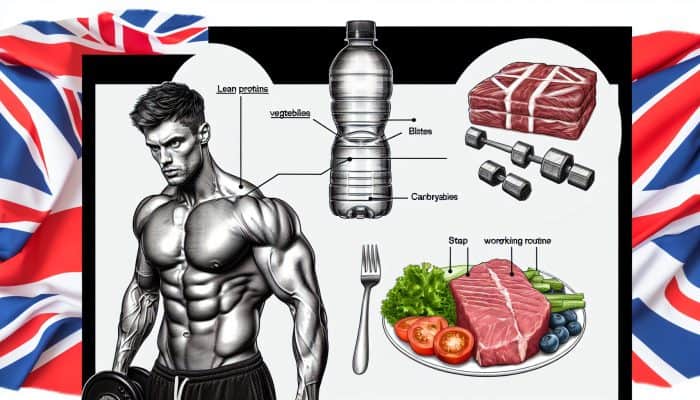Uncover the Vital Role of Protein in Muscle Development
Discover How Protein Facilitates Muscle Repair and Growth Efficiently

Protein serves as an indispensable component in the intricate processes of muscle repair and growth, acting as the primary building block for muscle tissue. Following rigorous workouts, where muscle fibers sustain micro-tears, the function of protein becomes crucial for the recovery and reconstruction of these fibers. This vital process not only augments muscle mass but also enhances overall strength. Key advantages of integrating protein into your muscle-building approach include:
- Speeding up muscle recovery after demanding exercise sessions.
- Promoting increased muscle hypertrophy through efficient muscle protein synthesis.
- Boosting performance in future workouts.
- Assisting in the prevention of muscle catabolism during periods of caloric deficits.
Incorporating sufficient protein into your daily nutrition not only supports recovery but also primes your body for upcoming workouts. This ongoing advantage guarantees that your muscle gains are enduring, fostering continuous enhancement in strength and muscle size. The essential function of protein in muscle development is irrefutable; it underpins the very essence of muscle growth and improvement.
What Is Your Ideal Daily Protein Requirement for Optimal Muscle Growth?
Establishing your daily protein requirements is critical for maximizing muscle growth and ensuring effective recovery. Several factors, including body weight, activity level, and specific fitness goals, significantly influence the quantity of protein your body necessitates. As a general guideline, those with active lifestyles aimed at increasing lean muscle should target a protein intake ranging from 1.6 to 2.2 grams per kilogram of body weight.
For instance, an individual weighing 70 kg should strive for approximately 112 to 154 grams of protein daily. It’s vital to assess your personal circumstances; individuals engaged in high-intensity training may require an even greater protein intake. Additionally, distributing protein consumption evenly throughout the day can optimize its benefits, further enhancing continuous muscle repair and growth.
Which Protein Sources Are Most Effective for Promoting Muscle Gain?
When selecting protein sources, emphasizing quality is just as crucial as quantity. High-quality protein sources deliver the essential amino acids necessary for muscle repair and growth. It’s important to diversify your protein options in your diet to guarantee comprehensive nutrient intake. The most effective protein sources for muscle gain comprise:
- Lean meats, such as chicken, turkey, and lean cuts of beef.
- Fish, especially fatty types like salmon and tuna, known for their omega-3 fatty acids.
- Eggs, recognized for their complete amino acid profile and versatility in various meals.
- Plant-based proteins including legumes (like lentils and beans), tofu, tempeh, and quinoa.
Choosing protein sources that align with your dietary preferences and lifestyle can significantly enhance your muscle-building journey. Whether you embrace a meat-inclusive or vegetarian diet, a vast array of nutritious options is available globally, from the vibrant markets of Thailand showcasing tofu and legumes to organic farms in Italy supplying fresh eggs and poultry.
Insights from Experts on Building Lean Muscle with Protein

Which Types of Protein Are Most Effective for Muscle Building?
Different types of protein can significantly impact muscle-building results. Whey protein, renowned for its rapid absorption, is particularly beneficial for post-workout recovery, as it quickly delivers essential amino acids to the muscles. Conversely, casein protein digests at a slower rate, providing a sustained release of amino acids, making it ideal for overnight muscle recovery and repair.
Plant-based proteins, sourced from legumes and nuts, can also be highly effective when consumed in adequate amounts. For example, athletes on a vegan diet can combine various protein sources—such as rice and beans—to ensure a complete amino acid profile. Consider your dietary preferences and workout schedule when selecting your protein source; certain situations might call for a combination of whey and casein or a mix of plant-based proteins to maximize muscle growth.
How Does the Timing of Your Protein Intake Influence Muscle Growth?
The timing of your protein consumption can significantly enhance muscle protein synthesis, particularly in relation to your workouts. Consuming protein both before and after exercising can promote recovery rates and stimulate muscle growth effectively. Aim to enjoy a protein-rich meal or snack within 30 minutes to two hours after your workout.
Implementing a structured approach can optimize the timing of your protein intake. Here are some actionable steps to consider:
- Enjoy a protein-rich snack or shake immediately following your workout.
- Plan meals that include protein both prior to and post-training sessions.
- Incorporate protein into your breakfast to kickstart muscle recovery early in the day.
- Adjust protein intake before bedtime to support overnight muscle repair.
By strategically timing your protein consumption, you can maximize recovery and muscle growth, ensuring that every workout effectively contributes to your overall fitness goals.
How to Combine Protein with Other Nutrients for Optimal Results

Achieving optimal muscle growth necessitates more than just protein; it’s crucial to integrate it with carbohydrates and healthy fats, which are essential for effective recovery and overall nutrition. Carbohydrates restore the glycogen stores depleted during workouts, while fats play a vital role in hormone production, necessary for muscle growth.
Finding the right equilibrium in your meals can significantly amplify your muscle-building efforts. For example, aim to include a blend of protein-dense foods, complex carbohydrates, and healthy fats. A post-workout meal could consist of grilled chicken (protein), quinoa (carbohydrate), and avocado (healthy fat). Strive to prepare meals that are not only rich in protein but also nutritionally balanced, as this will enhance recovery and muscle growth.
Understanding the Contribution of Protein to Building Lean Muscle
What Are the Mechanisms Behind Protein in Muscle Synthesis?
Protein is essential for muscle synthesis as it provides amino acids, which are the fundamental building blocks of muscle tissue. Once ingested, protein breaks down into amino acids that play a significant role in muscle protein synthesis (MPS)—the crucial process responsible for repairing and constructing new muscle tissue. This cycle is vital for individuals aiming to enhance their lean muscle mass, as it highlights the critical components of muscle recovery and growth.
Understanding the mechanisms governing a protein’s function in muscle synthesis empowers individuals to refine their dietary choices. The stimulation of MPS occurs in response to resistance training combined with adequate protein intake, which collectively promotes muscle adaptation and hypertrophy. By ensuring an ample supply of protein, you cultivate a favorable balance between muscle protein synthesis and breakdown, which is indispensable for muscle growth.
How Does Protein Quality Affect Muscle Development?
The quality of the protein consumed has a significant impact on muscle development. High-quality proteins, often referred to as complete proteins, contain all nine essential amino acids necessary for muscle repair and growth. Typically, proteins derived from animal sources, such as meat, fish, and dairy, are considered complete, while many plant-based proteins may lack one or more essential amino acids.
To enhance muscle-building efforts, it is imperative to prioritize high-quality protein sources. For instance, blending various plant proteins can create a complete amino acid profile, facilitating effective muscle development. By recognizing the importance of protein quality, individuals can make informed dietary choices that will effectively bolster their fitness objectives.
How Does Protein Help Combat Muscle Breakdown?
Maintaining adequate protein intake is crucial for preventing muscle catabolism, particularly during phases of caloric deficit or intense training. Muscle breakdown can occur when the body lacks essential nutrients required for sustaining physical activity, leading to a decrease in lean muscle mass.
By ensuring sufficient protein consumption, individuals can safeguard against muscle catabolism and foster an anabolic state. Protein not only aids in recovery but also supplies the necessary substrates for muscle tissue maintenance. Regularly including protein-rich foods in your diet can help protect against muscle loss, ensuring that your hard-earned gains remain intact.
Proven Strategies for Integrating Protein Into Your Diet
How to Strategically Plan Meals for High Protein Intake
To achieve your muscle-building ambitions, meticulous meal planning is vital for ensuring you meet your daily protein needs. Crafting a high-protein meal plan involves selecting appropriate foods and balancing them with other essential nutrients. Here are some meal planning tips to help you maintain a high-protein diet:
- Incorporate a protein source in every meal, such as eggs for breakfast or chicken for lunch.
- Prepare high-protein snacks, like Greek yogurt or protein bars, for convenient nutrition on the go.
- Batch-cook protein-rich meals for easy access throughout the week.
- Experiment with diverse protein sources to keep meals interesting and varied.
Strategically arranging your meals not only helps you achieve your protein goals but also supports overall dietary balance. Consider integrating local culinary traditions that emphasize protein-rich foods into your diet, facilitating seamless incorporation.
How to Effectively Use Protein Supplements
Protein supplements can be a valuable addition to your diet, particularly if you’re struggling to meet your protein needs through whole foods alone. Supplements, such as whey protein powder or plant-based protein blends, can help bridge the gap between your protein requirements and actual intake.
To utilize protein supplements effectively, consider your fitness goals. If your aim is muscle gain, choose a supplement with a higher protein concentration. If maintenance is your focus, a more balanced approach may be more suitable. Additionally, timing your supplement intake—such as right after your workouts—can enhance its effectiveness, facilitating muscle recovery and growth.
What Are the Best Practices for Distributing Protein Throughout the Day?
Evenly distributing protein intake across the day is a strategy that can optimize muscle protein synthesis. Instead of consuming a large quantity of protein in one meal, strive for consistent protein intake at every meal and snack.
Research indicates that consuming 20-30 grams of protein per meal can effectively stimulate muscle protein synthesis, making it easier to meet your total daily protein goals. For instance, an eating schedule could incorporate 30 grams of protein at breakfast, lunch, and dinner, supplemented with protein-rich snacks throughout the day. This balanced approach supports muscle growth while helping to maintain energy levels and promote overall well-being.
How to Select High-Quality Protein Sources
Choosing high-quality protein sources is fundamental for optimal nutrition and health benefits. Focus on including a diverse range of protein-rich foods in your diet. Lean meats, fish, eggs, and dairy products represent excellent protein sources, while plant-based options like legumes, tofu, and quinoa also provide essential amino acids.
Prioritizing quality over quantity can greatly influence your muscle-building journey. For example, opting for wild-caught fish can deliver additional nutrients such as omega-3 fatty acids, which are beneficial for reducing inflammation. By making informed choices about your protein sources, you can enhance your overall health while effectively supporting muscle development.
How to Modify Protein Intake for Different Life Stages?
As we progress through various life stages, our protein requirements evolve. Whether due to growth spurts in adolescence, the demands of pregnancy, aging, or intense athletic training, understanding these changes can assist you in adjusting your protein consumption for optimal health and performance.
For instance, adolescents may require higher protein intake to support growth, while older adults often need increased protein to counteract age-related muscle loss. Similarly, pregnant women typically need additional protein for fetal development. By modifying your protein intake according to these life stages, you can ensure your body receives the necessary support, ultimately contributing to lasting health and vitality.
What Are the Benefits of Building Lean Muscle Through Protein?
Experience Improved Physical Performance and Strength
Building lean muscle through adequate protein consumption can substantially enhance your physical performance and overall strength. An increase in muscle mass equates to improved power output, endurance, and athletic capability. Whether you are a competitive athlete or simply engage in recreational fitness, lean muscle provides the strength necessary for both everyday tasks and sports activities.
Moreover, as strength escalates, so does self-confidence, which encourages greater involvement in physical pursuits. This positive feedback loop nurtures a commitment to fitness, essential for sustaining a healthy lifestyle. As you grow stronger, daily activities become easier, contributing to a better quality of life.
Enhance Your Body Composition and Metabolism
Lean muscle mass plays a crucial role in improving both body composition and metabolic rate. An increase in muscle mass leads to a higher basal metabolic rate (BMR), meaning your body expends more calories even at rest. This metabolic boost assists in weight management and fat loss, simplifying the process of maintaining a healthy weight.
Additionally, the thermic effect of protein—where the body expends energy digesting and metabolizing protein—further supports effective weight management. By concentrating on building lean muscle through adequate protein intake, you establish a sustainable approach to achieving and maintaining your desired body composition, ultimately enhancing your overall health and fitness.
Uncover Long-Term Health Benefits Linked to Muscle Mass
Maintaining lean muscle mass offers numerous long-term health benefits. Research indicates that increased muscle mass correlates with improved bone health, a reduced risk of injury, and enhanced longevity. Muscle mass supports your skeletal structure, acting as a protective barrier against conditions such as osteoporosis and fractures.
Furthermore, a higher muscle mass can improve insulin sensitivity, lowering the likelihood of chronic diseases such as type 2 diabetes. By prioritizing protein for muscle growth, you not only gain immediate fitness benefits but also establish a foundation for long-term health and well-being.
Accelerate Recovery and Reduce Injury Risks
The significance of protein in muscle repair and growth cannot be overstated. Sufficient protein intake speeds up recovery time and minimizes injury risks, which is vital for maintaining consistent training and performance. Protein aids in mending micro-tears incurred during workouts, ensuring that you bounce back stronger and are prepared for your next training session.
Additionally, a well-nourished body is better equipped to withstand the challenges of intense training. By integrating protein-rich foods into your diet, you can help safeguard against injuries, enabling you to train consistently and achieve your fitness aspirations.
Research-Backed Insights on the Advantages of Building Lean Muscle with Protein
How Does Protein Intake Affect Muscle Recovery?
Protein intake is a pivotal element in muscle recovery, as it supplies the body with essential amino acids necessary for repairing and reconstructing muscle tissue. Studies reveal that individuals who consume adequate protein after exercising experience faster recovery times compared to those with insufficient intake.
Recovery encompasses more than just mending damaged muscle fibers; sufficient protein intake also aids in replenishing energy reserves and mitigating muscle soreness. This aspect is especially crucial for athletes and fitness enthusiasts, as effective recovery leads to a greater capacity to train rigorously and improve performance over time.
What Is the Role of Protein in Muscle Hypertrophy?
Protein is foundational for muscle hypertrophy, which refers to the increase in muscle size. Research suggests that a higher protein intake correlates with greater muscle growth in response to resistance training. Consuming approximately 1.6 to 2.2 grams of protein per kilogram of body weight has proven to maximize hypertrophic responses.
The anabolic effects of protein contribute to stimulating muscle protein synthesis, thereby fostering muscle growth. For those serious about building lean muscle, prioritizing protein intake within this range is essential for achieving optimal results.
What Does Science Reveal About Protein and Muscle Maintenance?
Maintaining muscle mass is crucial for both aesthetic and health-related purposes. Scientific evidence underscores the importance of regular protein intake in preserving muscle tissue, particularly as individuals age. The natural decline in muscle mass, known as sarcopenia, can lead to diminished strength and functionality.
By ensuring adequate protein consumption, older adults can counteract this decline and sustain their quality of life. Consistently including protein-rich meals throughout the day can be a key strategy in preserving muscle mass and promoting overall health as we age.
Dispelling Common Myths About Protein and Muscle Building
Addressing the Misconception of Excessive Protein Intake
A prevalent myth surrounding protein consumption is that excessive protein automatically results in muscle gain or could lead to adverse health effects, such as kidney damage. In reality, the body requires a balanced intake of nutrients. While considerable debate exists regarding optimal protein levels, it is essential to recognize that the body can efficiently process substantial amounts of protein when balanced with other necessary nutrients.
Moderation and balance are key; consuming protein beyond your body’s requirements might not yield additional benefits and can result in unnecessary caloric intake. Prioritizing overall dietary balance will be more beneficial than fixating on any single macronutrient.
What Is the Truth About Protein Timing and Muscle Building?
While protein timing has garnered significant attention, it is not as critical as the total amount of protein consumed daily. Although consuming protein around workout times can be advantageous, the overall protein intake throughout the day is what truly matters. Prioritizing a consistent and adequate protein intake is the most effective way to foster muscle growth.
Assess your daily routine and pinpoint opportunities to integrate protein into your meals and snacks, ensuring that your total intake aligns with your fitness objectives.
Can Plant-Based Protein Be as Effective as Animal-Based Protein?
Plant-based protein can indeed be as effective for muscle building as animal-based protein, provided it is consumed in sufficient quantities and variety. Many plant-based proteins, derived from legumes, nuts, and seeds, can deliver the essential amino acids necessary for muscle synthesis.
By thoughtfully combining plant proteins—such as rice and beans or lentils and quinoa—you can achieve a complete amino acid profile, offering the same muscle-building advantages as animal-based proteins. Regardless of whether you choose a plant-based or animal-based diet, the critical factor is ensuring your protein intake meets your individual needs.
Practical Strategies for Enhancing Protein Intake for Muscle Growth
What Are Simple Ways to Boost Your Daily Protein Intake?
Incorporating additional protein into your daily diet can be both straightforward and enjoyable. Here are some practical tips to effectively elevate your protein intake:
- Add Greek yogurt or cottage cheese to your breakfast or enjoy them as snacks.
- Include a protein source in every meal, such as chicken, fish, or tofu.
- Mix protein powder into smoothies or oatmeal for an effortless way to enhance your protein intake.
- Opt for high-protein snacks, like nuts, jerky, or protein bars, to keep you satisfied throughout the day.
By implementing these simple strategies into your daily routine, you can increase your protein consumption without feeling overwhelmed or restricted.
How to Balance Protein with Other Macronutrients
To support overall health and muscle growth, it is vital to balance protein intake with carbohydrates and fats. Each macronutrient serves a distinct function in the body; carbohydrates provide energy, while healthy fats support hormone production and nutrient absorption.
Work to create meals that incorporate all three macronutrients. For example, a meal featuring grilled salmon (protein), quinoa (carbohydrate), and sautéed vegetables (fiber and nutrients) ensures a well-rounded nutritional profile. By focusing on balance, you can promote muscle growth while maintaining overall health.
How to Adjust Protein Intake Based on Your Fitness Goals
Customizing your protein intake according to your specific fitness objectives is crucial for success. Individuals aiming to gain muscle may need to increase their protein intake to support muscle hypertrophy, while those focused on maintenance may require slightly less.
Regularly reassessing your protein needs based on training intensity and personal goals will help optimize your dietary strategy. Consider maintaining a food diary to monitor protein intake and make necessary adjustments as your objectives evolve.
How to Time Your Protein Intake for Optimal Muscle Recovery
Maximizing muscle recovery hinges on the timing of your protein consumption. Consuming protein shortly after workouts can help replenish the amino acids required for repair and growth. Aim for a protein-rich post-workout meal or snack within 30 minutes to two hours after exercising.
Additionally, consider incorporating protein before bedtime to support overnight recovery. This strategy can be especially beneficial for individuals engaged in intense training programs, ensuring your body stays in an anabolic state even while resting.
How to Choose High-Quality Protein Sources for Muscle Building
High-quality protein sources are critical for effective muscle building. Focus on selecting lean meats, fish, eggs, and dairy products as reliable protein sources. Plant-based proteins, such as beans, lentils, and tofu, also provide excellent alternatives for individuals following vegetarian or vegan diets.
Emphasizing quality over quantity is vital for maximizing muscle synthesis. Aim to diversify your protein sources to ensure comprehensive nutrient intake that supports overall health and performance. Incorporating local foods rich in protein can enhance your diet while honoring cultural culinary traditions.
Frequently Asked Questions About Protein and Muscle Growth
How much protein should I consume to build muscle?
To optimize muscle building, aim for 1.6 to 2.2 grams of protein per kilogram of body weight daily, adjusting based on your activity level and specific goals.
Is protein powder necessary for muscle growth?
Protein powder is not essential but can be a convenient means to meet protein needs, especially if whole food sources are insufficient.
Can I effectively build muscle on a plant-based diet?
Yes, building muscle on a plant-based diet is possible by consuming a variety of protein sources to ensure you obtain all essential amino acids.
What is the ideal time to take protein supplements?
Take protein supplements post-workout to facilitate recovery, but you can also consume them throughout the day to meet overall protein goals.
How can I determine if I’m consuming enough protein?
Keeping a food diary and tracking your protein intake can help you assess whether you’re meeting your daily requirements for muscle growth.
Is it possible to consume too much protein?
Excessive protein intake may not lead to muscle gain and can contribute to unnecessary caloric intake; hence, balance remains essential.
What are the optimal protein sources for vegetarians?
Vegetarians can meet their protein needs by incorporating sources such as legumes, tofu, tempeh, quinoa, seitan, and dairy products into their diet.
Does the timing of protein intake truly matter?
While timing protein intake around workouts can be beneficial, total daily intake is more crucial for effective muscle growth.
Can a high-protein intake harm my kidneys?
For healthy individuals, a high protein intake is generally safe. However, those with preexisting kidney conditions should consult a healthcare professional.
What role does protein play in weight management?
Protein supports weight management by increasing feelings of fullness, boosting metabolism, and preserving lean muscle mass during weight loss.
Connect with us on Facebook!
The Article Building Lean Muscle With Protein: A Comprehensive Guide appeared first on https://athleticsupplement.com
The Article Building Lean Muscle: Your Essential Protein Guide Was Found On https://limitsofstrategy.com






